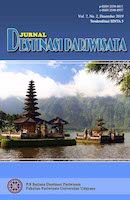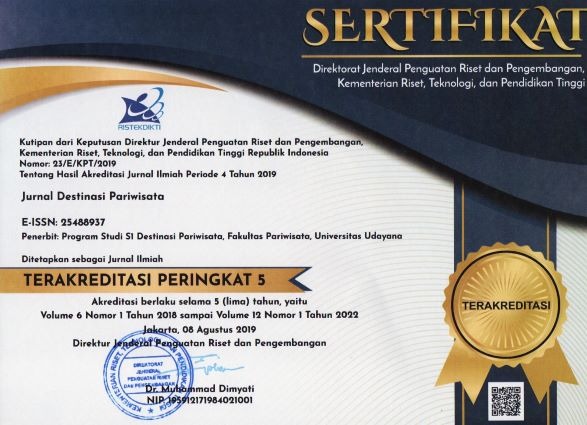Perkembagan Wisata Mendaki Di Gunung Agung
Studi Kasus Gunung Agung,Kabupaten Karangasem,Provinsi Bali
Abstract
Bali as one of the axes of Indonesian tourism, has two types of tourism, including mass tourism and special interest tourism. Both tours have each interested person or tourist that can be seen from the motivation of visiting tourists. The development of mass tourism in Bali experienced a good increase of the number of tourist destinations from the early days of tourism taken over by the Indonesian government from colonialism in the 1960s to the present time is the type of tourism that brought tourists the most. in contrast to special interest tourism, this type of tourism is not considered to be one of the sources of regional income because the characteristics of tourism activities tend to be carried out with a limited number of tourists. Like the potential of Mount Agung. Gunung Agung has the potential of nature and culture and has a high historical value. Until when tourism enters Bali, Gunung Agung has not been glimpsed to become one of the tourist attractions. At that time Mount Agung was still used as a place for carrying out Hindu spiritual activities. Along with the development of knowledge and technology at that time, a new activity was born in Mount Agung, namely outdoor climbing activities. Tourism then joins with the climbing activity so that the new tourism power will be called Gunung Agung for hiking activities.Related to the above matter, the formulation of the problem in this study was formed, raising about the potentials found in Mount Agung which was later linked to the formulation of the second problem, namely the development of tourism climbing Mount Agung. This study used the observation method, researchers in this topic also acted as one of the activists of hiking tourism activities and then looking for data by interviewing people who were considered relevant to the problem such as the head of the tourism conscious group, a climber in the 1970s, forestry agency the province of Bali, as well as a guide who guides tours up Mount Agung. As for the results obtained in this study, the first is the potentials found in Mount Agung are natural potential, cultural potential, and artificial potential. Natural potential in the form of cliffs, slopes, forests, and the crater of Mount Agung. cultural potential in the form of pelinggih and temples at certain points along the Besakih line and Pura Pasar Agung. while the artificial potential in the form of climbing activities, paragliding, and others. The results of the second question formulation question will then be presented using the tourismemorphosis analysis concept (Anom et al. 2018) which explains the development of using four stages including the introduction stage, reaction stage, institutionalization stage, and the Compromise stage.
Keywords: Bali tourism, Tourismemorphosis, Mount Agung, tourism special interests
Downloads









